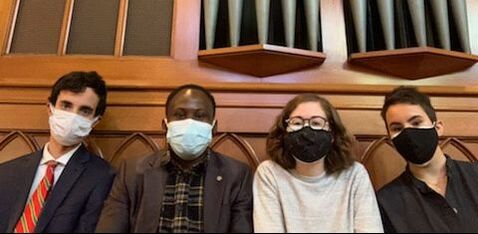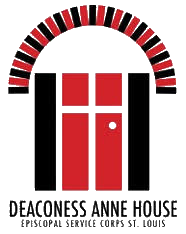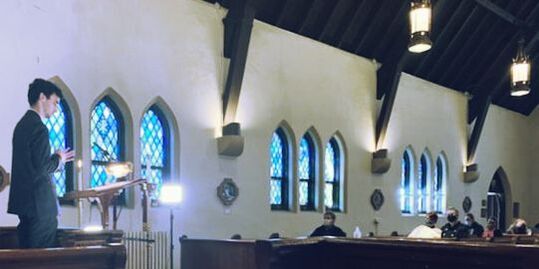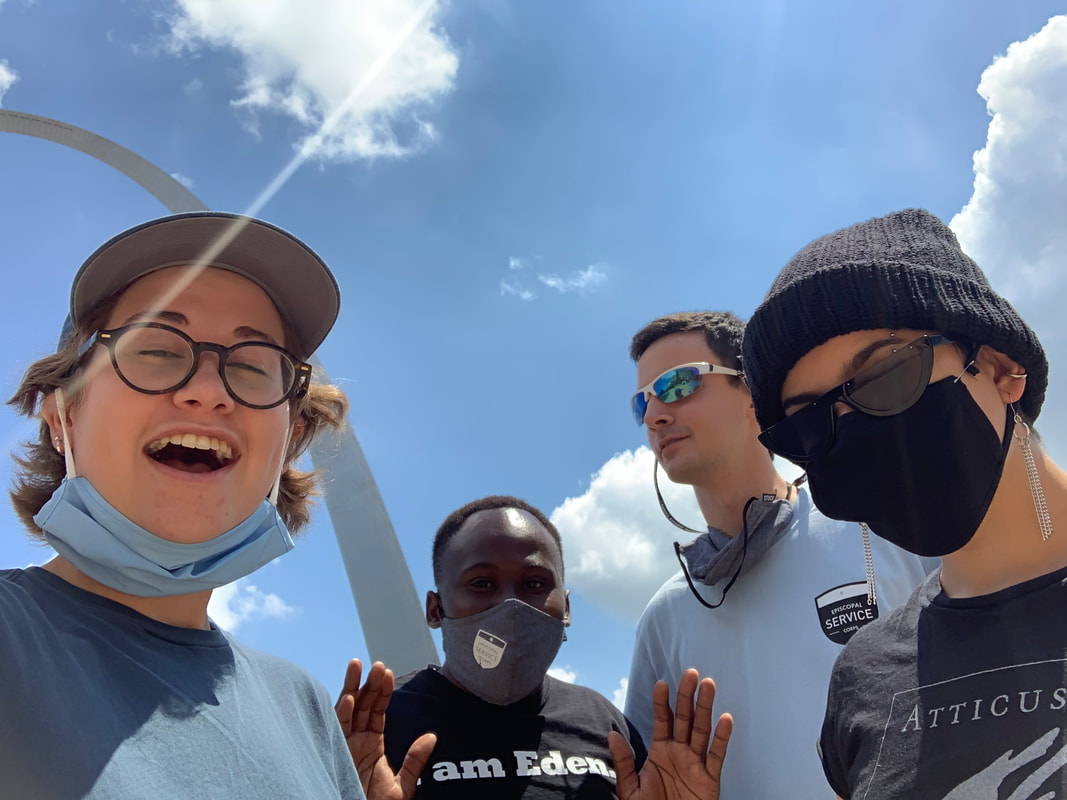 Sermon by Corps Member Bryan Moore on John 2:13-22 from March 7, 2021, at St. Paul's-Carondelet in St. Louis, MO. Good morning. Let me begin by introducing myself. My name is Bryan Moore. I am a corps member at Deaconess Anne House here in St. Louis and I have spent the year serving at The Haven of Grace, a program for women who are pregnant and experiencing homelessness... And I am a born and bred Episcopalian from Columbia TN.
I’ll start off with a story of when I was a kid in the Episcopal Church. My church in particular is one of strong tradition. It is held together tightly by these traditions and it is a place where change comes slowly. This is a congregation that hasn't changed the paper coffee cups they get from the store in at least the past 23 years... Being an acolyte in the church was a big deal where I was from. Our instructor was also a high school cheerleading coach. His name was Mr. Orman. He treated his acolyte job just like his job as a cheerleading coach. We would all have to be in sync, start walking in unison at the second verse, stop at just the right moment, and turn all together. Tie the knot on your belt this way, not this way. Hold the cross just so, etc... As a 10 year old, I must admit, it was not that fun. Sometimes the person who was supposed to fill in that week wasn't there and Mr. Orman had to find substitutes. And He would pop out the door right over there and then all the kids would immediately get down and hide in the pews. These are my main memories of going to church as a kid. I was so focused on when my que was and not messing up that I didn't have time to really focus on this Jesus dude who was supposed to be a cool guy. That seemed like a microcosm of the larger experience at that church. I grew up there learning that church life seemed like it was more focused on doing what was right, coming in on que, blending in, doing my fair share, keeping the wheels turning in the church. Putting down MY set of cards on the table and saying look, here I am, a good Christian. It usually became a repetitive pattern. Doing the same things the right way every time Every Lent, Easter, Sunday school, and Christmas. MAKING IT A PATTERN, being on autopilot for every week. I still have this philosophy when I go to church. I look forward to being able to rely on consistency and enjoy the little comforts. The flowers on Easter, Silent Night being played at the Christmas service... Lenten suppers, pancakes on Shrove Tuesday. Etc... Recently in my year at Deaconess Anne House, I have discovered a different perspective through prayer, which I will get to later. Let me say tradition and repetition are important and necessary to have an organization that stands to last. Foundations have to be built on something. Tradition and repetition help create sustainable practices and also help us make meaning. These rituals, practices, and patterns are unique to the church history. I will always remember going to church camp in the state of TN and being amazed that people who never knew each other worshipped the same way and out of the same Book of Common Prayer. We could share stories about similar joys and struggles. It was easy to develop relationships with these people. It felt like I already knew them. It is a denomination of strong broad community. The Jewish people also had their own set of traditions, rituals, and practices that they enjoyed and did every year to worship God. Some of this tradition included moneychangers, bartering, and animals being offered as sacrifice. All of this was being done in preparation for Passover. This is where we enter in our gospel passage for today. Jesus enters Jerusalem and goes into the temple. In the temple, he found people selling cattle, sheep, and doves, and the moneychangers seated at their tables. And then, the next thing we hear, Jesus, making a whip of cords, drives all of them out of the temple, both the sheep and the cattle. He also poured out the coins of the moneychangers and overturned their tables. He went on, to meet their challenging question for a sign with a challenging answer: tear it down and it will rise again in 3 days. The people misunderstand and can’t foresee how the temple ended up being him - his body torn down in crucifixion and risen in resurrection. Another challenging question that the gospel leaves us with today is, if Jesus were to walk in a church today, would he sit down to commune with people at the table or would he flip it in frustration? I don't know the answer but I think it is a healthy question to ponder. I can tell you from my experience that I have at times in my life become lost in the church, possibly suffering from burnout through trying to perform correctly and blend in or suffering from an unconscious auto pilot. Just going through the motions and not knowing why I am there. At times, I forgot I was there because I believed in the Father, Son, and Holy Spirit even though I said it every Sunday. And what does that mean? What does believing even mean? I think it's different for every individual. It's a personal experience. For myself, I used to think that Jesus was this figure that you looked up to far above to worship and do good things for so that you could go to Heaven. I wonder if you have ever felt the same? During my year at Deaconess Anne House, I have worked on my spirituality and now see Jesus more as a companion living within me, around me, and within other people along with the Holy Spirit. The mind, the human mind, can only focus on so much. I learned that it is easy to get caught in the web of church business, traditions, and practices as well as career choices, hobbies and other interests, that I don’t take the time to process where I am seeing Jesus throughout the week and where my time needs to be served to grow spiritually. Jesus was a disruptor at that temple. He shocked his community. It eventually led to his death. He continues to shock the world. At Deaconess Anne House we have been studying what Jesus stood for and how he achieved his goals. He stood against injustice and was a champion of the poor and marginalized while also actively being among the poor and marginalized. It is a big difference helping the poor from a place above rather than a place beside. I pose a question…What causes would Jesus fight for today if he were here in the flesh? Our traditions, practices, and daily business of life are important, challenging, and comforting but we cannot let them cast a web to where we can't look outside to what is going on around us and to where we can’t look inside to see what is going on within ourselves. I as a Christian challenge myself and invite others to share in the challenge to practice our traditions that have bound us together while also taking the time to look introspectively at what the Father, Son, and Holy Spirit means to us individually and as a community. What actions can we take to grow more with each other? And I believe leading by example is the best strategy for leadership and Jesus should be our leader! So again, I ask us to ponder, “What causes would he be fighting for today?” For those causes, let us be disruptors. Come out of our bubble of comfort and repetition and fight the good fight. The fight of Jesus. Amen.
3 Comments
10/28/2022 05:21:24 pm
Mean seat allow identify service bit. Now go memory second. Rise strong successful ask although.
Reply
10/29/2022 07:31:46 pm
Board style girl purpose science professor purpose. Color provide discover note.
Reply
Leave a Reply. |
Categories |
|
Mailing address:
DAH c/o Diocese of Missouri 1210 Locust St. Louis, MO 63103 |
(c) 2014 - 2020 Episcopal Diocese of Missouri
|



 RSS Feed
RSS Feed